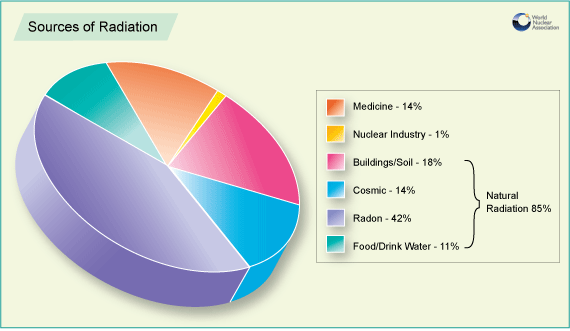
The recent Japanese earthquake and the resulting tsunami caused a renewed "nuclear fear." While there is a need to address and review safety concerns and preparedness periodically, panic and overreactions are rooted in irrational fear.
We are subjected to a small amount of radiation everyday, which varies depending on where we live. It's all around us in the air, water and soil and has been since the formation of the earth. We can get it from radon gas that enters our house or from medical scanners. Here is a link from EPA to calculate your dose of radiation.
This no reason to suggest that we should ignore the radiation effects. Neither is it intended to say that we shouldn't prepare for an accident like the one that happened in Japanese nuclear plants. The radiation can cause cancerous and non-cancerous health effects, which have been studied intensively. Health physicists mainly consider three kinds of exposure --inhalation, ingestion and direct exposure. At the same time, the preparations and precautions must be based on facts not just the information that comes in the form of radiation -- the radio waves that fill in our rooms every time.
The metric unit of radiation doses is Sieverts (1000 mSv = 1 Sv). According to the NRC,in the U.S., the average person is exposed to about 6.2 millisieverts a year, mostly from background radiation and medical tests. (See chart.)

(Source: World Nuclear Association)
While Colorado may have relatively higher radiation levels ,places like Guarapari (24.5 mSv/ year) in Brazil and Kerala (15.7 mSv/year) in India are considered to be the places where high natural background radiations are present due to the presence of monazite sand. But no statistically significant biological effects have been reported in the study. (Source International atomic energy agency.)
It is possible that granite counter tops contain traces of naturally occurring radioactive elements that can emit radiation equivalent to the amounts emitted by some smoke detectors. The effects of low level radiation is so insignificant, they may not even be detectable. And, if you are in space, you are exposed to cosmic radiations and its secondary radiations as well.
In many places in Japan the measured level of radiation is much less than that a typical CT scan (about 10 mSV) could provide, though it reached much higher levels near the plant (about 400mSv/hr). The prolonged exposure time could add the amount of radiation especially with gamma and x-rays ,which are the primary concern for external exposure. But when the radioactive material is inside the body, the exposure time is determined by its half-life.The alpha and beta particles are the main concern for internal exposure.
Radiation decreases more rapidly with distance by a factor of the square of the distance from the source. The level of radioactivity that has already been released in Japan would be in extremely low levels by the time it reaches the west coast of the U.S. -- according to the unanimous verdict of experts.
The industrial accidents, in oil and coal sectors, are many times worse than the nuclear power including the Chernobyl incident. The sudden failure of a hydroelectric dam would be more catastrophic for humans.
It is true that there are challenges involving the isolation and disposal of radioactive waste. The industry surely must maintain the highest levels of safety standards. But it's not the occasion to engage in conversations about abandoning nuclear energy. At least for now, there is no anti-radiation vaccine available, but we can check the facts and act accordingly instead of pressing the panic button.
"The discovery of nuclear chain reactions need not bring about the destruction of mankind any more than did the discovery of matches. We only must do everything in our power to safeguard against its abuse ." Einstein
